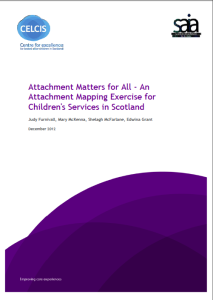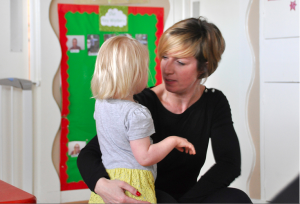 Childcare is all over the British media at the moment. The new Conservative Government has just announced that it plans to bring forward its proposals to double the number of childcare hours it funds, to 30 hours per week. That feels like it should be a good news story. It hasn’t turned out that way.
Childcare is all over the British media at the moment. The new Conservative Government has just announced that it plans to bring forward its proposals to double the number of childcare hours it funds, to 30 hours per week. That feels like it should be a good news story. It hasn’t turned out that way.
The Scottish Government, too, has been increasing the number of hours it funds. The entitlement is now 600 hours per year (roughly 16 hours per week) for all 3-4 year-olds, as well as 2-year-olds who are ‘looked after’ or whose parents are in receipt of benefits.
From an historical perspective, such policies are celebratory. During the Industrial Revolution, it was legal for the children we now care for in nursery – those aged 4 years old (yes, really, 4!) — to be put out to work, climbing up chimneys and scrabbling under massive machines. That now seems unbelievable.
However, the hourly rate being offered by Governments is being lamented by childcare providers. The average rate the Government offers, of £3.80 per hour, comes nowhere near the minimum rate required by childcare providers, of £5.50 per hour. And even a basic rate of such low value cannot possibly support the high quality provision called for by 20+ years of empirical research. One doesn’t need to know the detailed research findings to realise that £5.50 doesn’t equate to ‘high quality’.
 When Neil Leitch, CEO of the Preschool Learning Alliance, was interviewed on BBC Radio 4’s Today Programme on Monday, he acknowledged with regret and something approaching embarrassment that the childcare sector is often unable to meet the requirements for a living wage of £7.85 per hour. Fascinating. The early years are the period of time when brains are growing faster than they ever will again. Everyone who is in government has to be aware of that fact these days. It has been pointed out in multiple reports, presentations, media stories and committee enquiries. But we don’t wish to signal to the people who care for our children during the most fundamental period of their brain development how much they matter, by ensuring we can offer them a living wage? In 21st century Britian, our children aren’t worth £7.85 an hour?
When Neil Leitch, CEO of the Preschool Learning Alliance, was interviewed on BBC Radio 4’s Today Programme on Monday, he acknowledged with regret and something approaching embarrassment that the childcare sector is often unable to meet the requirements for a living wage of £7.85 per hour. Fascinating. The early years are the period of time when brains are growing faster than they ever will again. Everyone who is in government has to be aware of that fact these days. It has been pointed out in multiple reports, presentations, media stories and committee enquiries. But we don’t wish to signal to the people who care for our children during the most fundamental period of their brain development how much they matter, by ensuring we can offer them a living wage? In 21st century Britian, our children aren’t worth £7.85 an hour?
These arguments about the inadequacy of funding are well publicised. I want to build on them by drawing attention to concerns that have received rather less attention in the debate. I want to talk about ways in which the current nursery policy actually risks damaging our children’s development, rather than enhancing it.
 For a child to feel safe in a nursery setting, he has to make relationships with the staff and other children. Because government-funded places are not available in all nurseries, many parents are coping by taking children to two or even three different settings over the course of a week. This allows parents to claim their full entitlement of government-funded hours. However, that amount of change isn’t good for children’s development. It doesn’t promote emotional security. It is ironic that providers and parents spend such a lot time reflecting on how to help children ‘settle’, but government policy in itself can foster ‘UNsettling’.
For a child to feel safe in a nursery setting, he has to make relationships with the staff and other children. Because government-funded places are not available in all nurseries, many parents are coping by taking children to two or even three different settings over the course of a week. This allows parents to claim their full entitlement of government-funded hours. However, that amount of change isn’t good for children’s development. It doesn’t promote emotional security. It is ironic that providers and parents spend such a lot time reflecting on how to help children ‘settle’, but government policy in itself can foster ‘UNsettling’.
- Funding for ‘vulnerable’ or ‘looked after’ 2-year-olds has become central to the vision driving these new policies. Such language makes it sound like we are doing these children a favour, by giving them additional hours of early education. Yet what if we changed our language? What if we called them ‘traumatised’ 2-year-olds? That’s what they are. Any child who has entered the care system is an emotionally traumatised child – or else they wouldn’t need social work support. What traumatised children need more than anything else are emotionally secure relationships, which can give them a sense of safety and familiarity. Nurseries funded at £3.80 per hour, with a ratio of one adult to six children, cannot possibly do that, no matter how well-intentioned they are. That means that the current nursery policy for vulnerable 2-year-olds is likely to make their emotional damage worse, rather than help them to heal.
 Childcare staff are not being given training in understanding the needs of traumatised 2-year-olds. There is no plan, nor money available, for sector-wide training in attachment, neuroscience, or trauma. The behaviours of traumatised children are different from those of non-traumatised children, precisely because their attachment systems and self-regulatory capacities have been strained. In order to heal, children need staff who can recognise those altered behaviours. But we are now legislating to have ALL the traumatised toddlers in the country that we know of (ie., all of those who have entered the care system) spend time with staff who are not trained to understand those behaviours. The ACE Study tells us that we are shooting ourselves in the foot with this new policy. We are making it more likely that these vulnerable children will, in a few years’ time, end up in prison, on drugs, committing suicide. That will cost us more money than we saved. That’s not poor policy. Its stupid policy.
Childcare staff are not being given training in understanding the needs of traumatised 2-year-olds. There is no plan, nor money available, for sector-wide training in attachment, neuroscience, or trauma. The behaviours of traumatised children are different from those of non-traumatised children, precisely because their attachment systems and self-regulatory capacities have been strained. In order to heal, children need staff who can recognise those altered behaviours. But we are now legislating to have ALL the traumatised toddlers in the country that we know of (ie., all of those who have entered the care system) spend time with staff who are not trained to understand those behaviours. The ACE Study tells us that we are shooting ourselves in the foot with this new policy. We are making it more likely that these vulnerable children will, in a few years’ time, end up in prison, on drugs, committing suicide. That will cost us more money than we saved. That’s not poor policy. Its stupid policy.
 It is not only with regard to traumatised children that staff are being failed in their training needs. Many childcare staff receive little or no basic training in attachment. That may strike readers as surprising, given the fifty years for which attachment theory has now had empirical support, and the explosion of neuroscientific insights that has occurred over the past decade. But it is true. I had conversations at a nursery only a few weeks ago, with staff members who had completed their qualifications 6 months previously, as well as 5 years previously. None of them had been educated in attachment science, prior to attending a training day with me. A report published by The Centre for Excellence for Looked After Children in Scotland (CELCIS) in 2012 makes clear just how regrettably widespread this lack of knowledge is across all sectors dealing with children. Their investigations concluded that across the social work, education, nursing, other medical professions and childcare sectors, knowledge of children’s normal attachment processes is very poor. They remarked (pg 55): “The responses of professionals whose well-meaning [but unknowledgeable] attempts to intervene may undermine positive attachments and relationships, rather than support and strengthen them.”
It is not only with regard to traumatised children that staff are being failed in their training needs. Many childcare staff receive little or no basic training in attachment. That may strike readers as surprising, given the fifty years for which attachment theory has now had empirical support, and the explosion of neuroscientific insights that has occurred over the past decade. But it is true. I had conversations at a nursery only a few weeks ago, with staff members who had completed their qualifications 6 months previously, as well as 5 years previously. None of them had been educated in attachment science, prior to attending a training day with me. A report published by The Centre for Excellence for Looked After Children in Scotland (CELCIS) in 2012 makes clear just how regrettably widespread this lack of knowledge is across all sectors dealing with children. Their investigations concluded that across the social work, education, nursing, other medical professions and childcare sectors, knowledge of children’s normal attachment processes is very poor. They remarked (pg 55): “The responses of professionals whose well-meaning [but unknowledgeable] attempts to intervene may undermine positive attachments and relationships, rather than support and strengthen them.”
 There has been no rush to hire additional staff to cover additional statutory hours. How could there be? We are living in a time of austerity. Local authorities are facing cuts, not growth. The Early Years budget for the new Conservative Government is not ring-fenced, and thus can be decreased at any future point. I know of several local authorities in Scotland who have coped with the expansion of government-funded hours by ‘reallocating’ the staff they employ. Do you know where they were all re-allocated from? Answer: Outreach and support services. Local authorities are coping with the new government childcare policies by decreasing support services to vulnerable families. How does that help children and communities?
There has been no rush to hire additional staff to cover additional statutory hours. How could there be? We are living in a time of austerity. Local authorities are facing cuts, not growth. The Early Years budget for the new Conservative Government is not ring-fenced, and thus can be decreased at any future point. I know of several local authorities in Scotland who have coped with the expansion of government-funded hours by ‘reallocating’ the staff they employ. Do you know where they were all re-allocated from? Answer: Outreach and support services. Local authorities are coping with the new government childcare policies by decreasing support services to vulnerable families. How does that help children and communities?
- In their struggle to make budgets work, the rate at which local governments allocate national funding can turn out to be even worse than the rates I outlined earlier. Some local authorities are now offering contracts to private nurseries for the ‘2-year-old offer’ at £2.50 an hour. That’s less than a cup of coffee. One does not need a research scientist to point out that children are more valuable to us than coffee. Indeed, that is not a research question at all. That is a moral question.
 I am perplexed and frustrated by the situation in which we find ourselves. I argued earlier that every government official out there must, by now, have some awareness of the neuroscience and economics of early years. It is no longer excusable if they do not. This information has been covered at length in policy documents produced by all major parties. The coalition Conservative-led Government sponsored two major reports on early intervention in 2011, led by the MP Graham Allen. The impetus for Labour’s national Sure Start Programme was derived from this scientific literature. The Scottish Government has funded the Early Years Collaborative since 2012, with attachment featuring as a ‘key change’.
I am perplexed and frustrated by the situation in which we find ourselves. I argued earlier that every government official out there must, by now, have some awareness of the neuroscience and economics of early years. It is no longer excusable if they do not. This information has been covered at length in policy documents produced by all major parties. The coalition Conservative-led Government sponsored two major reports on early intervention in 2011, led by the MP Graham Allen. The impetus for Labour’s national Sure Start Programme was derived from this scientific literature. The Scottish Government has funded the Early Years Collaborative since 2012, with attachment featuring as a ‘key change’.
WHAT DOES IT TAKE to help these same politicians recognise that they hurt not just individual children and families with inadequate childcare policy? They also hurt the whole of the society they were elected to serve, as shown in studies of Adverse Childhood Experiences. Moreover, the analyses of economists like James Heckman confirm that, in failing to invest in high quality childcare, they actually waste the money we have trusted them to spend.
I am not the only one worrying about these issues. John Carnochan, OBE and previous Co-Director of the Scottish Violence Reduction Unit, asks in his forthcoming book whether our childcare strategy is motivated by providing an enriching early years experience for children or by getting women back into work as quickly as possible. The charity What About the Children? has recently called for a complete rethink of a childcare strategy that seeks to increase nursery care for 2-year-olds, arguing that “babies need loving, not learning”. The Preschool Learning Alliance has charged that the current plans to expand government-funded childcare hours will force the entire sector into “meltdown”. They are trying to highlight the irony of the situation: the funding that makes a childcare setting free for parents is set so low that it could actually bring about the collapse of that setting. Other major organisations, such as the National Day Nurseries Association and PACEY, agree, emphasising the way in which funding rates facilitate or hinder staff being able to build robust relationships with the children in their care.
 So it is worth throwing my hat into this august arena. Last week, I agreed to be interviewed on this topic by a press officer who was preparing an article for the Scottish press. I said, in a burst of frustration: “I wonder how well Nicola Sturgeon understands this science. She’s never yet been able to attend an Early Years Collaborative meeting. I wish she would just…call me!” The press officer said: “Can I quote you on that?” I replied, “Absolutely. Why not? Let’s get David Cameron to call, too!”
So it is worth throwing my hat into this august arena. Last week, I agreed to be interviewed on this topic by a press officer who was preparing an article for the Scottish press. I said, in a burst of frustration: “I wonder how well Nicola Sturgeon understands this science. She’s never yet been able to attend an Early Years Collaborative meeting. I wish she would just…call me!” The press officer said: “Can I quote you on that?” I replied, “Absolutely. Why not? Let’s get David Cameron to call, too!”
So, in case either of them miss that article, in their understandably busy lives, I am now repeating that invitation. Nicola, David, and any other interested politician at the local or national level: If you want to better understand how your policies are fundamentally shaping the brain development of all the children in the country, I would be happy to meet with you.
 I feel strongly about this because nursery policy has dramatically more relevance for our new political landscape than any politician yet realizes. The historian Michal Shapira recently published a book with the intriguing title ‘The War Inside: Psychoanalysis, Total War, and the Making of the Democratic Self in Postwar Britain.’ In it, Shapira asks: what kinds of citizens does a democracy need? What capacities of compassion, empathy, and tolerance are needed, and how can those be nurtured? How do those capacities differ from the ones needed in fundamentalist societies, such as the society that the extremist group ISIS seeks to build?
I feel strongly about this because nursery policy has dramatically more relevance for our new political landscape than any politician yet realizes. The historian Michal Shapira recently published a book with the intriguing title ‘The War Inside: Psychoanalysis, Total War, and the Making of the Democratic Self in Postwar Britain.’ In it, Shapira asks: what kinds of citizens does a democracy need? What capacities of compassion, empathy, and tolerance are needed, and how can those be nurtured? How do those capacities differ from the ones needed in fundamentalist societies, such as the society that the extremist group ISIS seeks to build?
In her book, Shapira argues that psychoanalysts working in the period after World War II re-shaped our thinking about democracy in fundamental ways that have gone unrecognised. Those psychoanalysts include people like Bowlby, Robertson, Winnicott, Freud, and Klein – all leaders of attachment theory. Attachment theory isn’t, ultimately, about babies. It is about us, about identity and belonging. It is about culture, past and future.
 In 2015, the UK finds itself in the midst of a democratic earthquake. The Scottish National Party swept to success in the May election, with a vision of social equality that ousted the Labour Party, which had been trusted for decades. The Liberal Democrats, ambassadors of liberal values, were virtually annihilated. UKIP, with its wish to return to old-fashioned values, received a whopping 4 million votes. The Conservative Party has been successful in depicting itself as representing “hard working families who just want to get on in life”.
In 2015, the UK finds itself in the midst of a democratic earthquake. The Scottish National Party swept to success in the May election, with a vision of social equality that ousted the Labour Party, which had been trusted for decades. The Liberal Democrats, ambassadors of liberal values, were virtually annihilated. UKIP, with its wish to return to old-fashioned values, received a whopping 4 million votes. The Conservative Party has been successful in depicting itself as representing “hard working families who just want to get on in life”.
Shapira is trying to say that attachment theory holds the key to determining how we create a more effective democracy within this transformed landscape.
Nicola, David: Call me.

Thank you for this excellent article. The name of the organisation I work with is Mothers at Home Matter. To be clear….we know fathers matter and we know extended family matter a great deal too but our focus is on the dire lack of support for mothers who by and large tend to be primary caregivers. Fathers are viewed as progressive and modern by policymakers – especially the more care they provide. Mothers on the other hand have been dismissed of late as dinosaurs unless carrying a briefcase to work after dropping off at nursery!! In other words the focus has been on helping working mothers – and that’s fine. But what about the time spent caregiving? Is this not of equal value? Yes we know that govt needs to invest in childcare support and needs to understand the importance of attachment – but we know this is already their intention, although they’re not really getting it right. What is NOT their intention is to support mothers as caregivers, fathers as caregivers – and , well , family life generally. This means a cross departmental approach – housing, health, education, welfare, social care, employment, family policy etc
Family needs to be at the heart of all they do.
What is needed is a new approach to CARE – we need to value care more. If we value childhood and children’s developmental needs then we simply must acknowledge the important contribution people make when they are caring for/raising children.
Excellent article addresses what needs to be addressed, yes money matters when our childrens care is concerned, yes it might be seen as favourable for all these extra childcare hours, however we must be mindful that many of our children who meet the criteria for “extra hours” have experienced disrupted attachment, yes there may be significant symptoms of this whilst in an early years setting, thats why it is imperitive that the resources are provided to our childcare provider to ensure our children needs are met, that means more specific training on why attachment matters and just as important the IMPACT of disrupted attachment on development without this awareness our childrens needs may not be met in an attachment focused way. With this increased awareness, understanding is promoted with this understanding the label “behavioural problems” may reduce. Also i think we need to acknowledge that extra child care hours may not be in the childs best interest, I know if i knew then what I know now my wee one would not have went to nursery at the age she did, not being disrespectful to the establishment she went to as they are the best of the best, conrtrivertial you may think, however as a kinship carer my wee one had not even established a secure relationship with me and I was leaving her in the care of others, on reflection many mornings were very distressing for her, I now realise she was terrified I was not coming back, just something we should also think about..T
Great article. I have shared with my (SNP) MP. The ISIS reference is out of place though.
A very powerful and passionate article. I watch in anticipation waiting to see if Nicolas or David call and the outcome of these discussions. I am so glad you have brought these issues to everyones attention. Keep up the good work.
This excellent piece identifies what is missing from childcare policy not only of this government but previous governments as well.
What is missing is, what is best for children and informed understanding about preventing harm to ensure children’s emotional well being.
Current childcare policy is being established to meet the demands parents’ work place and does not reflect what is known about the importance of sensitive, responsive one to one loving care of infants which is necessary to facilitate optimum brain development during the first 30 to 36 months of life when the brain grows at its most rapid.
With out due attention to these key pre requisites for optimum brain development and emotional well being, David Cameron will not achieve his aim for his new government ‘to build a Great Briton’.
What About The Children? was established as a national charity to speak out for the emotional needs of children under three not only because they are too young to speak out for themselves but because care in these early years of life has long term implications for their future physical, mental and emotional health.
As a well trained and degree level qualified Early Learning Educarer. I agree with your very powerful article. However not everyone in childcare is as ignorant about attachment as you are making out. I work in a local authority, one of the third largest authorities in Scotland. The majority of staff with in that authority have been trained on attachment. Myself and the staff in my establishment deliver attachment workshops as part of our nursery induction to new parents. We carryout further parent workshops throughout the year to extend parents knowledge on the importance of attachment and brain development. I understand this maybe, stable door and horse situation for some parents but if they are going to reproduce in the future, we hope this will have some impact. We also deliver the attachment power point to students who attend our nursery and train them on attachment during their time with us. (another very important topic the collages are failing students on). For many years now, I have said attachment workshops should be compulsory for expecting mothers. It should be delivered as part of their anti and pre-natal care. This is something Early Years Collabrative should be focusing on. As a practitioner, I feel having vulnerable two years olds in the setting would benefit them. They would be getting an extra year in a caring, nurturing and stimulating environment. Therefore we would only have to repair two years of neglect, bad parenting, under developed brain stimulation and attachment problems instead of three. I agree there are a lot of care sectors out there who need better training and better qualified staff. However people will only work and train more if they feel valued and get paid a salary reflecting the job they actually do. The new early years collabrative should be focusing on this, instead of spending money on endless literature that is pointless and irrelevant. GIRFEC “only if it doesn’t cost money”. These initiatives only work on paper, when it comes to funding them it’s a whole different story.
I sincerely hope Nicola and David read your article and call. I couldn’t agree with you more. I am an SNP supporter but on this issue a LOT more work needs to be done by the Scottish Government, and not just with regard to nursery. Give parents good information before their baby is even born. I would have found that invaluable and far more informative than my NHS ante natal classes. Educate and support parents. If parents knew how much and in what ways their child’s brain develops in those first 3 years, a lot of different choices might be made. Thank you for writing this and I hope it reaches the appropriate ears.
“WHAT DOES IT TAKE to help these same politicians recognise that they hurt not just individual children and families with inadequate childcare policy? They also hurt the whole of the society they were elected to serve, as shown in studies of Adverse Childhood Experiences. Moreover, the analyses of economists like James Heckman confirm that, in failing to invest in high quality childcare, they actually waste the money we have trusted them to spend. ” People need to see the big picture, especially politicians.